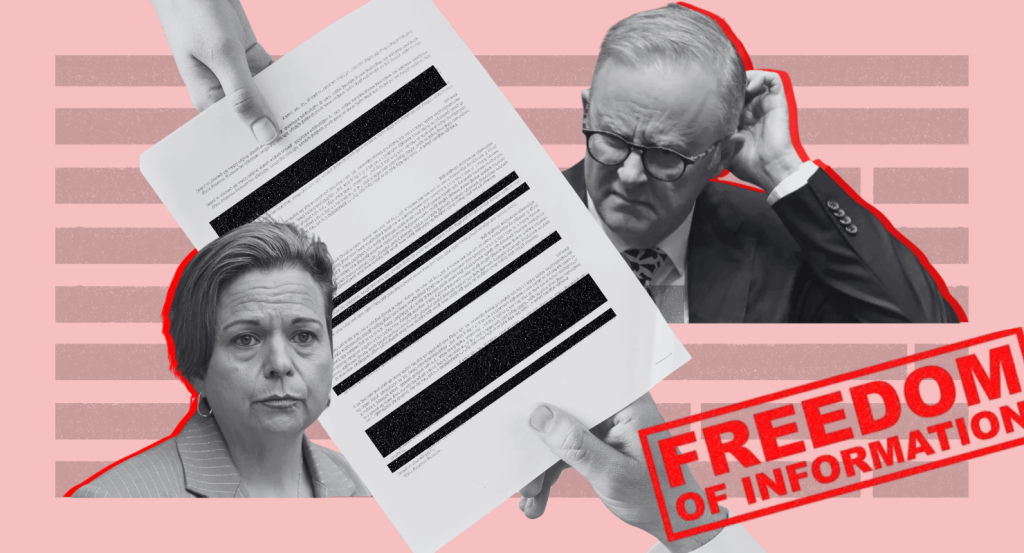Appropriately for a colossal attack on transparency, Labor’s freedom of information (FOI) bill is accompanied by an extraordinary, Trumpian lie about robodebt.
Attorney-General Michelle Rowland on Wednesday offered her justification for a key change which would dramatically alter the cabinet document exemption in our current FOI laws: that the change was based on what we’d learnt from the robodebt outrage.
And, indeed, the robodebt royal commission took aim at the cabinet document exemption in current FOI laws, in which documents with the “dominant purpose” of cabinet consideration are exempt, though other documents involved in the cabinet process but not meeting the “dominant purpose” test are available.
Related Article Block Placeholder
Article ID: 1219825
Royal commissioner Catherine Holmes noted that, had cabinet documents been available through FOI, the deception at the heart of robodebt — that it was an unlawful scheme and its authors knew that from the outset — would have been discovered much sooner. “That raises the real question of whether the protection of cabinet documents as a class from disclosure ought to be maintained or whether, when access is sought, disclosure should be given unless there is a specific public interest in maintaining its confidentiality.”
Holmes recommended the relevant section of the FOI Act be repealed, and suggested:
Independent. Irreverent. In your inbox
Get the headlines they don’t want you to read. Sign up to Crikey’s free newsletters for fearless reporting, sharp analysis, and a touch of chaos
By continuing, you agree to our Terms & Conditions and Privacy Policy.
The Commonwealth Cabinet Handbook should be amended so that the description of a document as a cabinet document is no longer itself justification for maintaining the confidentiality of the document. The amendment should make clear that confidentiality should only be maintained over any cabinet documents or parts of cabinet documents where it is reasonably justified for an identifiable public interest reason.
So, are Rowland and the government implementing Holmes’ recommendation? Listening to Rowland on Wednesday, you’d think so. “One thing I will say,” she told the ABC, “is that, as we found out through robodebt, which was another example of a lack of transparency which costs people’s lives under the previous government, just labelling something ‘Cabinet in Confidence’ does not make it so, and we intend to enshrine that in this law.”
Except, of course, you know where this is going: Rowland is doing exactly the opposite of what Holmes recommended.
Instead of rolling back the cabinet exemption, she’s dramatically expanding it, virtually back to where it was before Labor’s John Faulkner reduced the exemption in 2009, when everything vaguely connected to the cabinet process was exempt. The Centre for Public Integrity called it “a classic Yes Minister move”. Younger generations might call it something else: blatant gaslighting.
To hear Rowland invoking those who died as a result of robodebt, as though this bill is some sort of recognition of what they suffered, makes the lie particularly grubby and offensive. It’s an absolute disgrace.
Related Article Block Placeholder
Article ID: 1219841
It’s not the only lie hanging around the package. As Anton Nilsson noted yesterday, Rowland conjured the positively Trumpian fiction that “offshore actors” were using FOI to obtain information, but could produce no evidence whatsoever to back the claim, and could only offer one example of an agency being “flooded” with requests, involving the government’s internet censor, the e-safety commissioner. It’s just the latest example of national security being used as a fig leaf for government secrecy and evasion of accountability.
This is not only a bad bill, but a bad bill backed by bullshit from a government that has clearly had its big election win go to its head. Australia’s big media companies, the ABC and SBS have previously joined together to run an aggressive Australia’s Right To Know campaign to oppose government attacks on media freedom and lack of transparency. Such a campaign is required again to fight an immensely retrograde bill that would be the biggest attack on transparency in a generation, but even in the short period since the last campaign, the media’s resources for such a campaign have shrunk.
Freedom of information laws aren’t merely for the media or activists. They’re used by lawyers for clients pursued by governments, citizens caught up in outrages like robodebt, and non-government MPs as a way of cutting through the spin that ministers deploy to evade scrutiny. They are for everyone to use — and as savvy, politically engaged people, Crikey readers are the perfect citizens to use the FOI laws, before they’re neutered by Labor, to have a look inside the operations of government. We’ll have more to say about that in a new campaign starting on Monday.
Will you join us in exercising your right to freedom of information?
We want to hear from you. Write to us at letters@crikey.com.au to be published in Crikey. Please include your full name. We reserve the right to edit for length and clarity.



